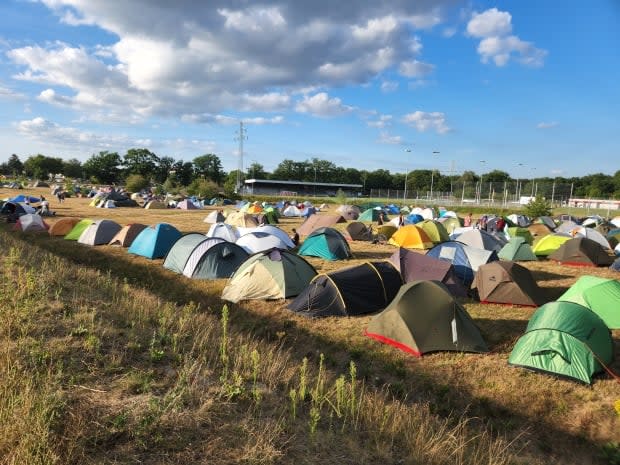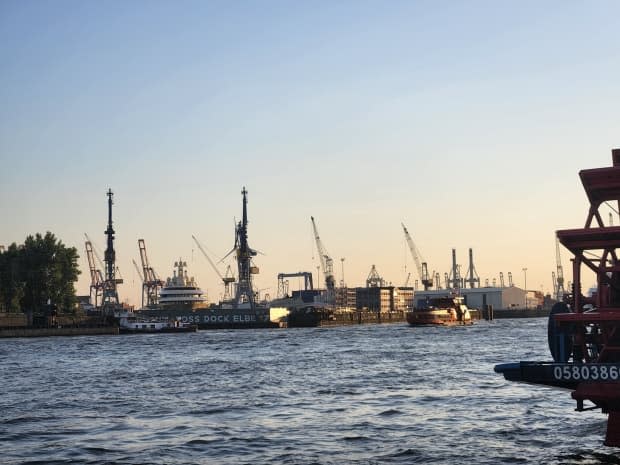Worried about a warming world, thousands of Germans reject using LNG — including Canada's

They rappelled down the side of Germany's iconic Elbphilharmonie building. Blocked a German liquefied natural gas site. And thousands of residents from across Europe filled the streets of Hamburg, Germany, in what has been a weeklong protest calling for a more sustainable society.
At the heart of their movement is this warning: liquefied natural gas (LNG) is not the solution to the energy crisis magnified by Russia's invasion of Ukraine.
As Russian military aggression in Ukraine reaches the six-month mark, governments and energy industry lobbyists, including Canada's, are floating the idea that adding LNG capacity could help circumvent Europe's reliance on Russia's oil and gas supply. But there's backlash to the idea, with one demonstrator in Hamburg suggesting that to invest more in LNG would be "climate suicide," exacerbating already high levels of carbon in the atmosphere.
"In general there's the idea that Europe needs LNG to stay warm in the winter and this is really a lie," Toni Lux told CBC News from the site of a protest camp set up this week in northwest Hamburg.

'A crime against climate'
Lux is with the German climate activist group Ende Gelände, who along with 40 other groups, came together to create the System Change Camp. Since Monday, an estimated 6,000 people from across Europe have joined in the festival-like atmosphere, tenting, working and sharing ideas in Hamburg's Altona Volkspark.
Many of those ideas have focused on alternatives to expanding LNG reliance, which the German government is considering in response to the energy crisis sweeping Europe.
But Lux said energy policy needs to stay fixed on transitioning to renewable sources, saying more terminals would be "a crime against climate and against people."

Since Russian President Vladimir Putin ordered the invasion of Ukraine on Feb. 24, sanctions imposed by Europe and the West sparked retaliation from the Kremlin in the shipment of energy supplies. Germany, in particular, has been hard hit as it relies heavily on Russian gas pumped through the Nord Stream Pipeline, which has been reduced to about 20 per cent of its usual supply since July 27. (The Kremlin has blamed the reduction on technical issues, saying that Western sanctions affected its ability to get turbines from Canada and perform other maintenance on the pipeline.)
Regardless, as energy prices around the world shoot upward, companies and governments — including Canada — are considering more LNG development as a possible solution.
WATCH | As Russia curbs natural gas exports, Europe has to conserve:
As Germany's co-ordinator of Transatlantic Cooperation, Michael Link has previously visited Ottawa promoting the need for more LNG and other trade between his country and Canada. Link said that while he understands it takes years to build infrastructure for LNG terminals, the need is urgent.
"I'm not speaking only about Germany," he said in an interview with CBC News Network's Power & Politics host Vassy Kapelos. "Italy, the Netherlands, a lot of us in the European Union really are in bitter need of safe democratic energy suppliers. And I think that would be good news for Canada too … because I see Germany and Canada and the European Union as a whole as ideal partners."
Could Canada ramp up LNG exports?
In June, Reuters reported that German government officials, including Chancellor Olaf Scholz, are interested in Canada's export potential for LNG, suggesting Scholz and Prime Minister Justin Trudeau met on the sidelines at a G7 summit.
At the same time, the news agency reported that federal Natural Resources Minister Jonathan Wilkinson has spoken with Canadian LNG companies with established infrastructure about whether they could increase exports to meet the demand from Europe.
In an update to CBC News, Spanish company Repsol said it's exploring ways to increase export capacity at its facility in New Brunswick.
"The company will look at any and all business that enhances or creates value at Saint John LNG, including the potential to add liquefaction capabilities to the existing facility, Repsol spokesperson Mike Blackier said.
Other Canadian oil and gas suppliers also say they're eager to expand further into Europe, with GNL Quebec saying it could help "Europe to diversify its energy sources."
Alberta-based Pieridae Energy has proposed a multibillion-dollar pipeline to ship natural gas from Western Canada to Nova Scotia, where it could then be sent across the Atlantic.

And though Germany is a world leader in decreasing its energy consumption, it's saying it needs more liquefied natural gas thanks to the shifting geopolitical landscape in Europe, said Pierre-Olivier Pineau, professor at Montreal's HEC business school.
The world should listen, he said.
But he notes that Canada's oil and gas sector wants guarantees before investing in new infrastructure to boost export capacity. And he's not certain that will happen.
"I've never heard Germany saying ... 'We are willing to sign a purchase contract for the next 20 years,' so that it secures all the financial aspects of the project," he said.
What expansion would look like in Germany
For LNG terminal expansion in Germany, there are proposals for growth at multiple spaces between now and 2030, mainly in the north of the country in regions that include Wilhelmshaven and Brunsbüttel, according to a report from Reuters.
On Saturday, police clashed with protesters as they attempted to block some bridges and rail lines. A small group of demonstrators broke from the crowd and managed to block Hamburg's Kattwyk Bridge, stopping rail traffic.
On Friday, several Ende Gelände activists were reported to have blocked an LNG site near Wilhelmshaven.
And earlier a fertilizer facility in Brunsbüttel was the site of another blockade.
Protests climaxed in the street march of thousands, all people calling on the country — and Europe — to find an alternative to LNG to address the energy crisis.
Charly Dietz, who also took part in the demonstrations, said Hamburg was chosen because of its importance as a major port city in trade in and out of Europe.
"I think for Germany, Hamburg will be one of the critical points for the future in terms of energy transition," Dietz said.
"We really feel like on a bigger scale together we can really move forward, push this capitalistic system to fail and build up society in solidarity to have a good life for everyone."
The German government says Chancellor Olaf Scholz will visit Canada for a three-day trip starting next Sunday to meet with Prime Minister Justin Trudeau. Scholz will be joined by Germany's economy and climate minister, Robert Habeck, and make stops in Montreal and Toronto. They'll also visit Stephenville on Newfoundland's west coast, where a potential new hydrogen agreement is expected to be signed.


